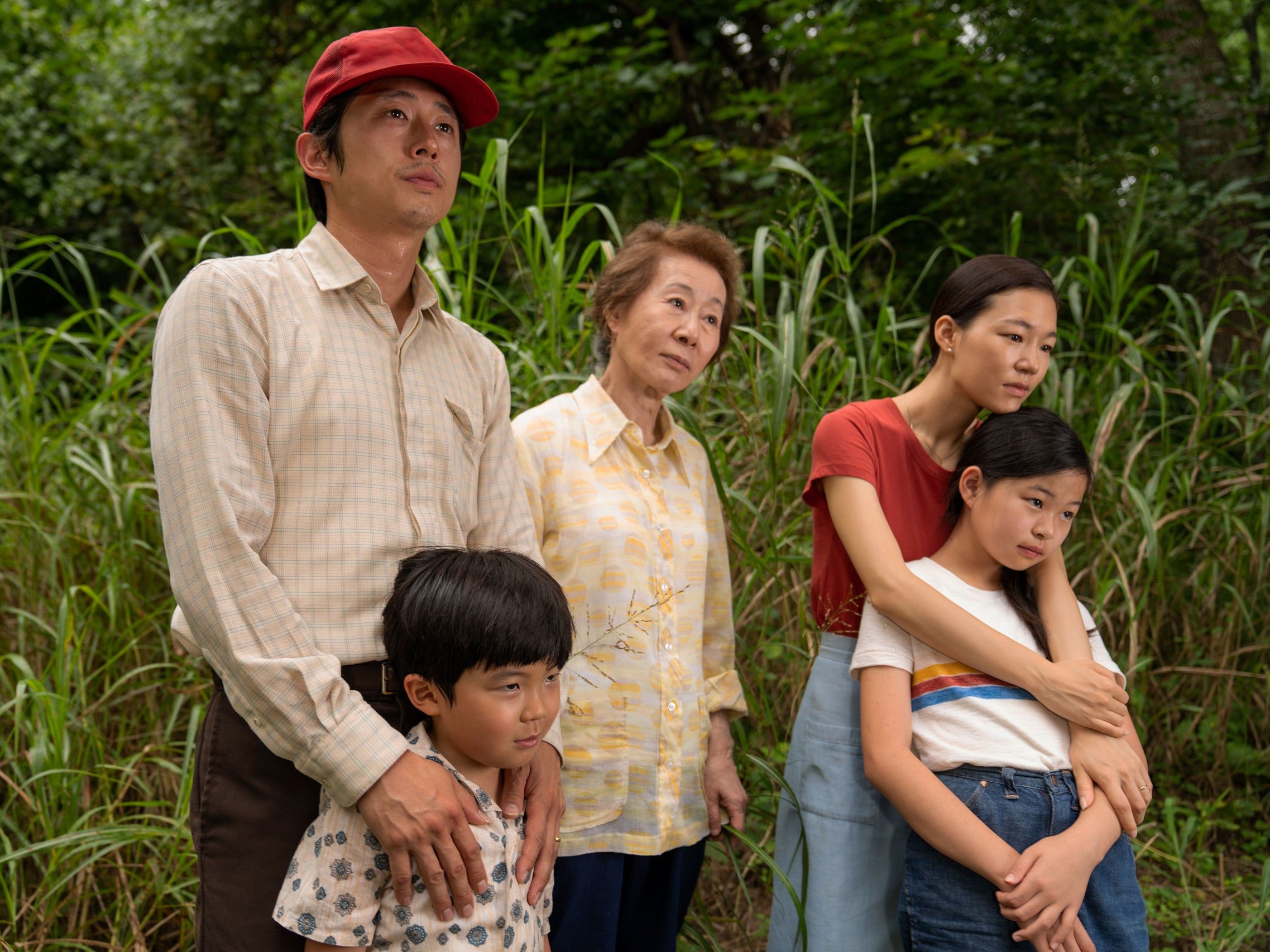Director Lee Isaac Chung’s Minari (2021) is a quasi-autobiographical drama that made headlines when it was nominated for the 93rd Academy Awards in 2021. Minari is a synonym for the Korean plant Minari which also goes by the name of water celery, and which is a signifier of hope and dream in the film. The film is a sweeping story about a family of five that broadly underline the idea of an American dream through different narrative tropes like evoking a feeling of nostalgia through recreating childhood, the 20th century American farms and more.
The Yi family- Jacob (Steven Yeun) and Monica (Han Ye-ri), along with their kids- Anne (Noel Cho) and David (Alan S. Kim), moves to Arkansas from California in the early 80s US to upgrade their finances and to make money. The couple work as chicken sexers in a hatchery for reasonable expenses and Jacob continues to toil on the side to start his business venture. Following a classic look and feel throughout, the film manages to move the audiences right from the very first scene where the lush green Arkansas visuals seem to speak to the viewers from the screen.
Similar Read to Minari (2021) : Minari (2021) Review: A Breathtaking Effort On Family And Resilience
While we see Jacob excited and hopeful in the prospect of starting his very own 50 acres farm, Monica is doubtfully wary and disapproving of the whole affair. Right from the time when she gets off the car to the climax, where she asks for separation. She could be Chung’s idea of an ‘exiled princess’ who was unwillingly trying to stick up for her marriage and children, despite her disapproval to move to the outskirts from the main city. The deterrent wife is not just the characteristic element to showcase hardships but also portrays the highs and lows of marriage. There are times when the couple is fighting and hurling abuses at each other, but there are also times when Monica bathes Jacob when he is physically hurting and Jacob tells Monica that he is making all the efforts for her sake. The dialogues and the narrative has been perfectly weaved to showcase that even in crumbling marriages, there is no white or blank condition or singular person, and most times it is the choices that two people in that relationship make. Just like Monica decides to choose ambition over her husband.
The entry of Grandma- Soonja (Youn Yuh-jung) in the film not only brings along “the smell of Korea” and the introduction of cultural roots (literally as in the vegetables, and also metaphorically) but also a bewildering sense of humor to the entire setting. Grandma is everything profane- crude, crotchety, smutty and foul-mouthed, but at the same time, she is also very adoring of her ‘weak’ grandson. Rightly winning the Oscars for the best supporting actress- the scenes with Youn Yuh-Jung reverberate with a spark that will make you fall in love with her character. The sparkle in her eye, her raw sense of humor and unrefined attitude add to the charm of the film. Youn is also one who brings the first mention of the word ‘Minari’ in the film. She plants the young saplings on her own accord that she had brought along, which later prove useful for the Yi family. Things seem to fall apart because of Grandma but in point of fact, they actually piece together- David’s health gets better, her Minari seeds save the family later on and even the fire that burnt everything actually brings the couple closer. And so we begin to question, is the character of Grandma a symbol of healing and redemption, is she the low-key savior?
Similar Read to Minari: 10 Great South Korean Movies on Netflix
Another pertinent theme in the film is the idea of life, death and rebirth. Chung constantly draws our attention to this, time and again at various points of the film- the church vocally talks about it, the almost dead and dry crops which came alive after Jacob watered them, Bucky Reed who lived there before the Yis and shot himself only to occupy the house as a ghost, the underlying theme of exorcism etc.

Minari very closely follows the personal lives of these five individuals as they learn to live and survive together without venturing into broader topics that were prevalent in those times or even now. Aside from a gentle mention of the Korean War, it is mostly fictional and is a personal account of the rhythmic family, fate, hope and destiny. It also did touch upon racism when David’s church friend remarked upon his ‘flat face’ but that remained an unexplored topic till the very end. The idea of the new nation and Korean immigrants remain untalked about through the length of the film, with primary focus on the personal lives of the Yi family.
That being said, the film is not a regular run of the mill feel-good film and what makes it different is its personal narrative which seems so rooted but is also quite subjective. Chung has very adeptly mixed the narrative of dreamism or magic realism with naturalism, which makes it all the more believable and true to form. Minari does follow a family story but it is not just restricted to a couple or centered around the children- it draws a clear contrast between the individualism and companionship in a marriage and advocates for both, so as a viewer it is difficult to empathize with one character’s dilemma.
Related Read to Minari (2021): The 30 Best Korean Movies of the 21st Century
Furthermore, it is infused with humorous moments that not only lightens the mood but also brings a much needed breather in an otherwise very feeling-full film. The whole incident with David peeing in a bowl and making his Grandma drink it, about how Jacob makes his children drink mountain dew as he believes that it is pure water from the mountains, David and his church friend Johnnie abusing each other while playing cards as he heard from his grandma will definitely spark a chuckle if not leave you in splits.
However, since the film does not have a central protagonist, it is difficult to follow a single trajectory or to view it through a definitive lens. Most chunks focus on David and his routine. But his character lacks the childlike playfulness, mannerisms, curiosity and recklessness prototypical to a 7-year old. Jacob’s character is well-refined- most of his inner conflicts could be felt rather than heard on screen. The desperate need to succeed, the anxiety with the water shortage, the tension after the crop deal is lifted- all of this and more, would leave you rooting for Jacob both as a character and as an actor.
Also, Read: Oscars 2021: The Complete List Of Winners At The 93rd Academy Awards
Another note-worthy aspect of Minari is it’s poetic cinematography, with the adulated color palette will make you fall in love with the American landscape of Arkansas. It is good to the extent that the few initial scenes are on the brink of romanticizing the notion of poverty owing to the verdant greenery, farm life, woody brown interiors of the portable house and so on. Lachlan Milne has left no stone unturned when it comes to color, texture, patterns and palettes. However, the pretty picture could not curtail the lack of intelligent scenes. Aside from the beautiful, there is a vast scope where the camera could be pivoted onto metaphors for a plethora of conflicts in the film- like marriage, idea of life and death, family and more.

![A Decade On: The Simpsons Movie [2007]](https://79468c92.delivery.rocketcdn.me/wp-content/uploads/2017/07/The_simpsons-1-.jpg)


![Heavy Trip [2018]: Fantasia Film Festival Review](https://79468c92.delivery.rocketcdn.me/wp-content/uploads/2018/07/Heavy-Trip-1-768x432.jpg)
![Bhavesh Joshi Superhero Review [2018]: Not a Great, but an Important Film](https://79468c92.delivery.rocketcdn.me/wp-content/uploads/2018/09/Bhavesh_Joshi_Superhero-768x326.png)
